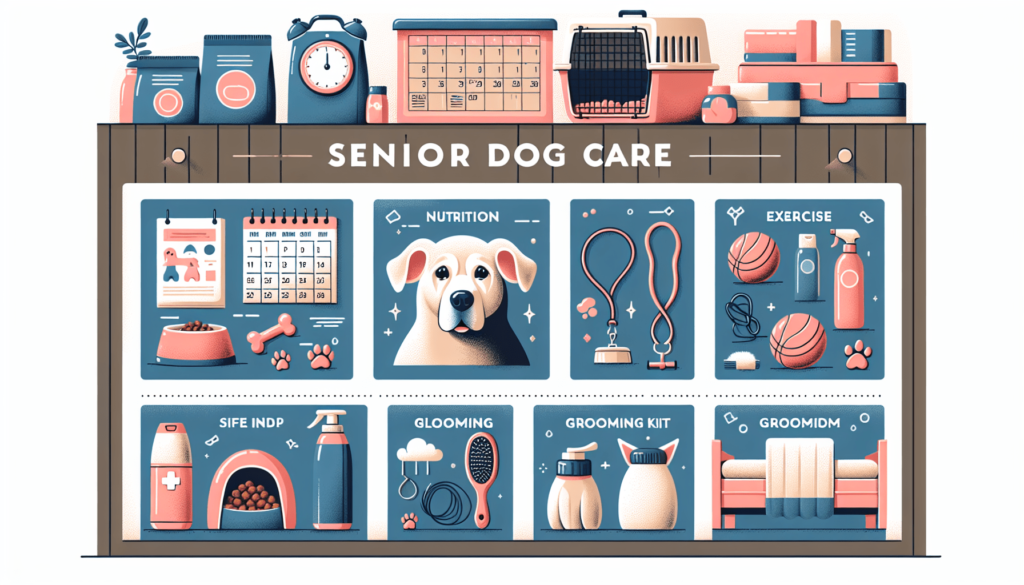As you nurture a lifelong bond with your furry companion, it’s important to provide them with the love and care they need in their golden years. In this guide to senior dog care and comfort, you’ll discover valuable insights and practical tips to ensure your aging dog’s wellbeing. From tailor-made nutrition plans and exercise routines to managing common health issues and creating a cozy environment, this article aims to empower you with the knowledge and tools needed to give your senior dog the best quality of life possible.
Healthcare and Veterinary Care
Regular check-ups are an essential aspect of senior dog care. Just like humans, older dogs are more prone to developing health issues, and early detection is key to successful treatment. During these check-ups, your veterinarian will thoroughly examine your dog, assess their overall health, and run any necessary tests. These routine visits allow the vet to identify any potential concerns and provide appropriate medical advice or interventions.
In addition to regular check-ups, specialized care may be necessary for your senior dog. As they age, dogs may develop chronic conditions such as arthritis, heart disease, or kidney problems. It is crucial to work closely with your veterinarian to manage these conditions and provide the best possible quality of life for your furry friend. Your vet may recommend specific treatments, therapies, or dietary adjustments tailored to your dog’s individual needs.
Medication and supplements can play a vital role in maintaining the health and well-being of senior dogs. Your veterinarian might prescribe medications to manage pain, inflammation, or other symptoms associated with aging. Additionally, supplements can support joint health, cognitive function, and overall vitality. Always consult with your vet before starting any new medications or supplements to ensure they are safe and appropriate for your dog.
Dental care is often overlooked but is equally important for senior dogs. Dental disease can cause pain, difficulty eating, and even lead to systemic health issues. Regular professional dental cleanings, along with daily brushing at home, can help prevent periodontal disease and keep your senior dog’s teeth and gums healthy. Your vet may also recommend dental-friendly diets or dental chews to promote oral health.
Nutrition and Diet
Senior dog food is specially formulated to meet the changing nutritional needs of older dogs. These diets are typically lower in calories and higher in protein and fiber, which helps maintain a healthy weight and supports the aging body. It is essential to choose a high-quality senior dog food that meets industry standards and suits your dog’s specific requirements. Consult with your vet to determine the best diet for your furry companion.
Weight management is crucial for senior dogs, as obesity can exacerbate many age-related conditions such as arthritis or heart disease. Maintaining a healthy weight helps reduce the strain on your dog’s joints and organs, leading to improved overall well-being. Your veterinarian can guide you on portion control and recommend appropriate feeding strategies to manage your dog’s weight effectively.
Establishing a feeding schedule can help ensure your senior dog receives balanced nutrition and helps prevent overeating. Feeding at regular intervals throughout the day creates a routine that your dog can rely on and reduces the risk of digestive issues. Consistency in meal timing also makes it easier to monitor your dog’s appetite and detect any changes that may require prompt veterinary attention.

Exercise and Physical Activity
Low-impact exercises are ideal for senior dogs to keep them physically active without straining their joints or muscles. Gentle walks, swimming, or supervised play sessions in controlled environments are excellent options for maintaining muscle tone and cardiovascular health. Engaging in regular exercise also benefits your dog’s mental well-being by providing mental stimulation and reducing anxiety or boredom.
Mental stimulation is just as important as physical exercise for senior dogs. Engage your furry friend with interactive toys, puzzle feeders, or scent games to keep their mind sharp and engaged. Mental exercises challenge their cognitive abilities and contribute to their overall happiness and cognitive health.
Regular exercise is vital for senior dogs to maintain their physical and mental well-being. It helps prevent obesity, muscle atrophy, and promotes healthy joint function. In addition to physical and mental benefits, exercise provides an opportunity for socialization and strengthens the bond between you and your beloved companion.
Mobility and Joint Care
Orthopedic beds provide crucial support and comfort for senior dogs with joint issues or arthritis. These beds are designed to relieve pressure on joints, distribute weight evenly, and promote healthy alignment. Investing in a high-quality orthopedic bed can significantly improve your dog’s mobility and quality of sleep, allowing them to rest comfortably and wake up refreshed.
Ramps and steps are invaluable tools for senior dogs, particularly those suffering from mobility challenges. These assistive devices help your furry friend navigate stairs, get on and off furniture, or access vehicles without putting undue stress on their joints. Ramps and steps provide a safe alternative to jumping or climbing, reducing the risk of injury and helping your dog maintain their independence.
Joint supplements are commonly recommended for senior dogs to support their joint health and reduce the symptoms of arthritis. These supplements often contain glucosamine, chondroitin, and other beneficial ingredients that help lubricate joints, reduce inflammation, and enhance mobility. Discuss with your veterinarian which joint supplement would be most suitable for your dog’s needs.

Comfort and Relaxation
Cozy bedding is essential for senior dogs’ comfort, especially those with arthritis or other joint issues. A soft, supportive bed provides cushioning for achy joints and helps your furry friend get a good night’s sleep. Consider investing in a bed with memory foam or orthopedic features to ensure optimal comfort for your senior dog.
Temperature control is essential for senior dogs, as they are more sensitive to extreme temperatures. As dogs age, their ability to regulate body temperature may decrease, making them more susceptible to heatstroke or hypothermia. Ensure your dog has access to a comfortable environment, provide adequate warmth during colder months, and avoid exposing them to excessive heat or cold.
Calming products, such as pheromone sprays, anxiety wraps, or calming music, can help reduce stress and anxiety in senior dogs. Many older dogs may experience increased anxiety or restlessness due to cognitive changes or age-related conditions. Calming products create a soothing environment and provide a sense of security for your furry companion.
Grooming and Hygiene
Regular brushing helps keep your senior dog’s coat healthy, shiny, and free from tangles or mats. Brushing removes loose hair, distributes natural oils, and stimulates the skin, promoting a healthier coat. Additionally, regular brushing allows you to inspect your dog’s skin for any abnormalities or signs of skin conditions, ensuring early detection and prompt treatment.
Skin and coat care is particularly important for senior dogs, as their skin becomes more delicate and prone to dryness or irritations. Using gentle, moisturizing shampoos and conditioners formulated for senior dogs helps maintain skin health and prevents excessive drying or itching. Your vet can recommend suitable grooming products based on your dog’s specific needs.
Nail trimming is crucial for senior dogs, as their nails tend to grow longer and thicker over time. Overgrown nails can cause discomfort, difficulty walking, or even lead to joint issues. Regular nail trims ensure your dog’s paws remain healthy and prevent any discomfort or pain associated with neglected nails. If you are uncomfortable trimming your dog’s nails at home, consult a professional groomer or your veterinarian.
Safety and Accessibility
Non-slip flooring is essential for senior dogs to prevent slips, falls, or injuries. Hardwood or tile floors can be slippery, causing mobility challenges for older dogs. Consider using area rugs or non-slip mats to provide traction and stability, especially in areas where your dog spends most of their time.
Assistive devices, such as harnesses or slings, can aid senior dogs with mobility issues, making it easier for them to navigate and walk. These devices provide additional support to the hindquarters or help lift the whole body, allowing your furry friend to move around more comfortably. Consult with your veterinarian or a professional pet mobility specialist to determine the most suitable assistive device for your dog.
Well-lit areas are crucial for senior dogs to prevent accidents and ensure their safety. Older dogs may experience diminished eyesight or develop conditions such as cataracts, making it challenging to see clearly in dimly lit spaces. Ensure your home has adequate lighting, especially in areas that your dog frequently accesses, to help them navigate safely.
Cognitive Health
Stimulating toys are excellent tools for promoting cognitive health and mental engagement in senior dogs. Puzzle toys, interactive feeders, or treat-dispensing toys provide mental stimulation and encourage problem-solving skills. These toys keep your dog intellectually active, reduce boredom, and provide a fun and engaging activity.
Training and mental exercises are indispensable for maintaining cognitive function in senior dogs. Continue to engage your furry friend in training sessions, teaching new tricks, or reinforcing existing commands. Mental exercises challenge their brain and improve memory, concentration, and overall cognitive abilities. Remember to keep the training sessions short and enjoyable, adapting to your dog’s individual pace.
Consistency and routine are vital for senior dogs’ cognitive health. Aging can bring about confusion or disorientation, and sticking to a familiar routine helps create a sense of stability and security. Feed your dog at the same time each day, maintain regular exercise regimens, and avoid sudden changes in the environment or daily activities.
Emotional Support
Spending quality time with your senior dog is one of the best ways to offer emotional support and strengthen your bond. Set aside dedicated time each day to engage in activities that your furry friend enjoys, such as gentle walks, cuddling, or playing their favorite games. This undivided attention reassures them and makes them feel loved and valued.
Social interaction is vital for senior dogs, whether it is with other dogs, humans, or even other animals. Regular outings to the dog park, visits to friends or family members’ homes with pets, or simply encounters with friendly neighbors can provide a valuable social experience. Social interaction helps prevent the onset of loneliness, depression, or anxiety often seen in senior dogs.
Separation anxiety can be common in senior dogs, particularly if they have formed a strong bond with their human companions. It is essential to address separation anxiety through positive reinforcement training, gradual desensitization, or seeking guidance from a certified professional dog trainer or animal behaviorist. Separation anxiety can cause significant distress for your senior dog, and resolving it can greatly improve their overall well-being.
End-of-Life Care
Palliative care focuses on ensuring the comfort and quality of life for dogs with terminal or chronic illnesses. It involves symptom management, pain relief, and emotional support for both the dog and their human family members. Working closely with your veterinarian can help determine the most appropriate palliative care plan and provide your senior dog with the best possible support during this challenging time.
Euthanasia considerations are an emotionally difficult but important topic to discuss. When a senior dog’s quality of life rapidly declines, and they experience severe pain or distress, euthanasia may be the most humane decision. It is essential to consult with your veterinarian, who can guide you through this difficult decision-making process and ensure your dog’s final moments are peaceful and pain-free.
Grief support is crucial for pet owners coping with the loss of a senior dog. The bond between a human and their canine companion is unique, and the loss can be profound. Seek support through pet loss support groups, counseling, or leaning on trusted friends and family members who understand the depth of your grief. Remember to be patient with yourself as you navigate the grieving process and honor the memory of your beloved senior dog.

